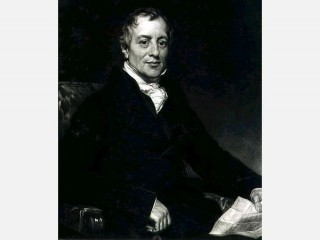
David Ricardo biography
Date of birth : 1772-04-19
Date of death : 1823-09-11
Birthplace : London, England
Nationality : English
Category : Politics
Last modified : 2011-02-17
Credited as : Economist, founder of political economy,
The English economist David Ricardo was a founder of political economy. His economics armed reformers attacking the agricultural aristocracy's political, social, and economic privileges.
David Ricardo was born in London on April 19, 1772, the son of a Jewish merchant-banker emigre from Holland. Ricardo joined his father as a stockbroker at the age of 14. When he married a Quaker, his orthodox father cut him off. Ricardo became a Unitarian, and at 22, with a capital of £800 and support from the financial community, he became an independent stockbroker. At 42 he retired with a fortune of about £1 million and established himself as a landed proprietor.
Ricardo was an independent member of Parliament for the pocket borough of Portarlington from 1819 until his death. He supported a tax on capital to pay off the national debt; currency reform; abolition of the Corn Laws protecting British wheat; parliamentary, poor-law, legal, and military reform; a secret ballot; and Catholic emancipation; he also condemned political repression.
Ricardo's reputation rests upon On the Principles of Political Economy and Taxation (1817; rev. 3d ed. 1821), an analysis of the distribution of a fixed amount of wealth among three classes: the owner of land who receives rent, the owner of capital who earns profits, and the laborer who gets wages. Ricardo set out to "determine the laws which regulate this distribution" in relation to both the rate of capital growth and the yield of wheat per acre. Although the analysis is abstract, often ambiguous, and disorganized, seven related economic laws can be extracted.
First, prices are determined by the cost of production. Second, the value of any item is set by the quantity of labor used to produce it. In the revised edition of 1821, Ricardo suggested that value might also be influenced by the cost of production. A third law, a theory of rent, was based upon Malthus's prediction of increasing population. When population increases, more food is needed and less fertile land is planted. Rent is the difference in the price of wheat per acre between the most and least productive land. As population grows, rent increases at the expense of capital's profits and labor's wages. The interests of landlords were not only antithetical to the rest of the community, but landlords and capitalists were necessary enemies.
The fourth and fifth laws deal with the wages fund and the natural price of labor. These laws assumed that the price of labor, like other market prices, fluctuated with supply and demand; but at any given time there was a fixed supply of money for the payment of wages. This wages fund was the amount of capital in circulation. As capital increased, population grew, less fertile land was planted, rent increased, capital profits decreased, and wages dropped. Ricardo held that population will tend constantly to rise above the wages fund, especially in old countries like England, causing the working man's standard of living to fall. Disaster was arrested only by population reduction, essentially through infant mortality. Ricardo, like Thomas Malthus, never anticipated either population control or technological increase of food supplies. If wages fell below subsistence level, population decreased; when wages neither increased nor decreased the labor supply, they reached their "natural" or subsistence level. Popularizers of Ricardo's general model interpreted this to mean that most people were doomed inexorably to bare subsistence.
The sixth law argues the "diminishing returns" of profits, the earnings of the most useful class. As increasingly inferior land is cultivated, rent and food prices rise, and profits fall since the higher wages required for subsistence wages come out of the existing amount of circulating capital. The final law, the quantity theory of money, applies value theory to gold: the rise or fall in prices depends inversely upon the amount of money in circulation.
Ricardo's other important writings were The High Price of Bullion (1810); "An Essay on the Influence of a Low Price on Corn on the Profits of Stock" (1815); "Funding System" (1820), published posthumously in the Encyclopaedia Britannica: Supplement (1824); and the "Plan for the Establishment of a National Bank" (1824), also published posthumously. He died at Gatcombe Park, Gloucestershire, on Sept. 11, 1823.
















